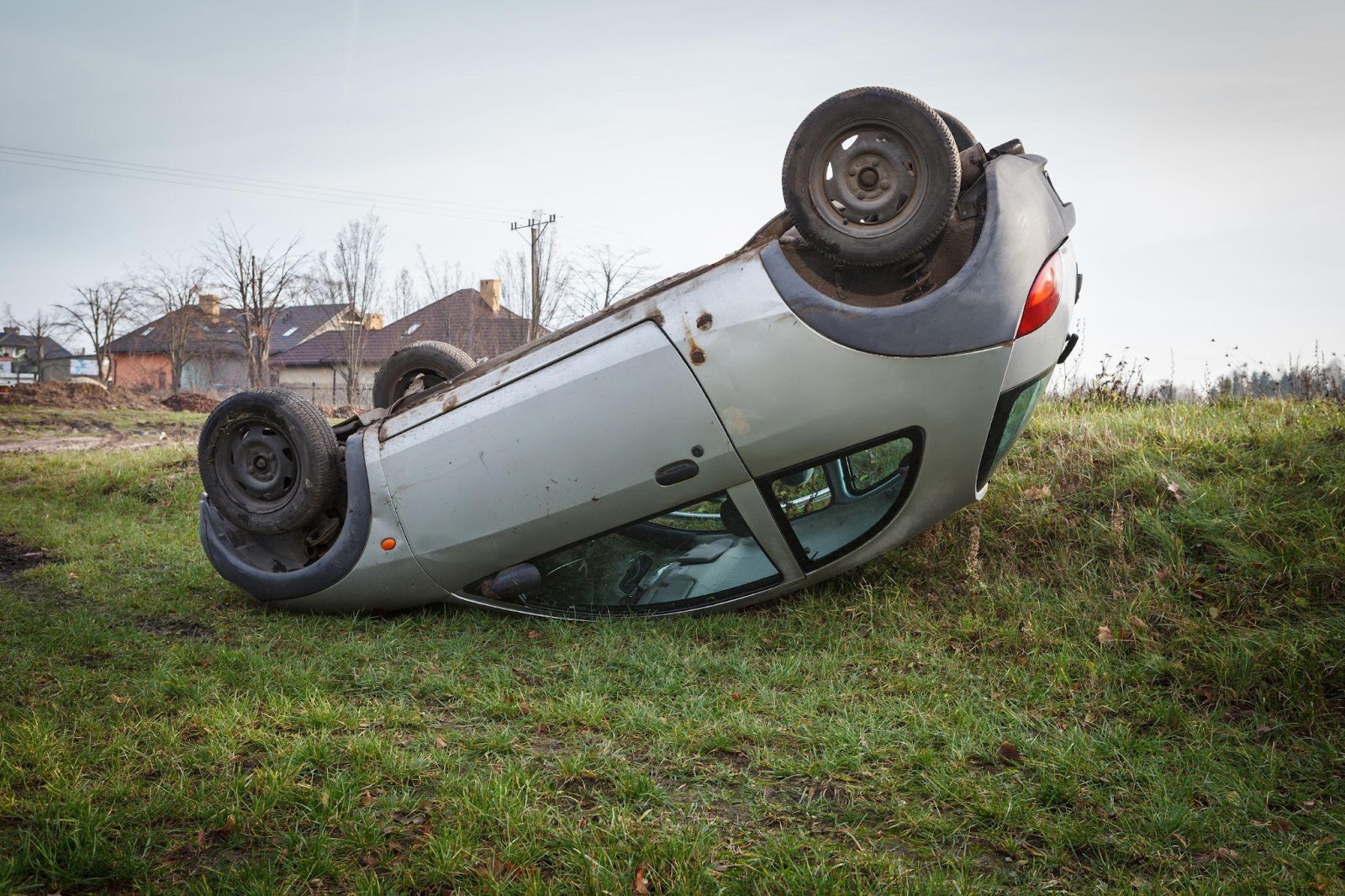
While rollover accidents account for only 3% of all serious crashes, they’re responsible for about 30% of passenger vehicle occupant fatalities.
Whether you’re navigating the winding mountain roads of northern Alabama or cruising along the Gulf Coast, understanding the causes of rollover accidents and your legal options is crucial for every driver in the Heart of Dixie.
Understanding Rollover Accidents
Rollover accidents occur when a vehicle tips onto its side or roof. These accidents are particularly dangerous due to their propensity for causing severe injuries and fatalities.
In Alabama, where diverse terrain and weather conditions can contribute to challenging driving situations, motorists must be aware of rollover risks.
Rollovers can happen to any vehicle, but certain types are more susceptible. SUVs, pickup trucks, and vans have a higher center of gravity, increasing their rollover risk.
However, even sedans can roll over under specific circumstances.
Common Causes of Rollover Accidents
Several factors can contribute to rollover accidents in Alabama.
Understanding these causes can help drivers take preventive measures and stay safe on the road.
- Vehicle Type and Design: As mentioned earlier, taller vehicles with a higher center of gravity are more prone to rollovers. This includes many popular vehicle types in Alabama, such as pickup trucks and SUVs.
- Speeding: Excessive speed, especially when taking curves or corners, significantly increases the risk of a rollover. Alabama’s maximum speed limit of 70 mph on rural interstates can tempt drivers to push their vehicles beyond safe limits.
- Distracted Driving: Activities like texting, eating, or adjusting the radio can take a driver’s attention away from the road, leading to sudden maneuvers that may cause a rollover.
- Impaired Driving: Alcohol and drugs impair judgment and reaction time, increasing the likelihood of making driving errors that could result in a rollover.
- Road Conditions: Alabama’s diverse landscape includes everything from mountainous terrain to coastal highways. Wet roads, ice, uneven surfaces, and unexpected obstacles can all contribute to rollover accidents.
- Tire Blowouts: Sudden tire failure can cause a driver to lose control, potentially leading to a rollover, especially at high speeds.
- Overloading: Improperly loaded vehicles, particularly trucks and SUVs, can become unstable and more likely to roll over during sudden maneuvers.
- Multi-Vehicle Collisions: Sometimes, a rollover occurs as a result of an initial collision with another vehicle, especially in side-impact crashes.
Understanding these causes is the first step in prevention. However, when rollover accidents do occur, it’s crucial to know your legal options in Alabama.
Legal Options After a Rollover Accident in Alabama
If you’ve been involved in a rollover accident in Alabama, you may be entitled to compensation for your injuries, property damage, and other losses.
Here’s an overview of your legal options:
- Insurance Claims: Alabama follows a “fault” system for car accidents. This means that the person responsible for causing the accident is also responsible for any resulting harm. Your first step may be to file a claim with the at-fault driver’s insurance company.
- Personal Injury Lawsuit: If insurance doesn’t cover all your damages or if the at-fault party is uninsured, you may need to file a personal injury lawsuit. Alabama’s statute of limitations allows two years from the date of the accident to file a lawsuit.
- Product Liability Claims: If a vehicle defect contributed to the rollover, you might have a case against the manufacturer. This could include issues with design, manufacturing, or failure to warn about potential risks.
- Wrongful Death Claims: In tragic cases where a rollover accident results in a fatality, the deceased’s family may be able to file a wrongful death claim.
- Government Liability: If poor road conditions or inadequate signage contributed to the accident, there might be a case against a government entity responsible for road maintenance.
It’s important to note that Alabama follows the doctrine of “contributory negligence.” This means that if you’re found to be even 1% at fault for the accident, you may be barred from recovering any damages.
This makes it crucial to have strong legal representation to protect your rights.
Frequently Asked Questions About Rollover Accidents in Alabama
To help you better understand rollover accidents and your legal options in Alabama, here are answers to some commonly asked questions we receive about rollover accidents in Alabama.
What Should I Do Immediately After a Rollover Accident in Alabama?
Your first priority should be your safety and the safety of others involved. Call 911 for medical assistance and to report the accident.
If possible, document the scene with photos and gather contact information from witnesses.
It’s crucial to seek medical attention even if you feel fine, as some injuries may not be immediately apparent.
How Is Fault Determined in a Rollover Accident in Alabama?
Fault is determined by investigating the circumstances of the accident.
This may involve police reports, witness statements, accident reconstruction experts, and analysis of physical evidence.
Remember, Alabama’s contributory negligence rule means that being even slightly at fault could affect your claim.
Can I Still Recover Damages if I Wasn’t Wearing a Seatbelt During a Rollover Accident?
While wearing a seatbelt is crucial for safety and required by law, not wearing one doesn’t automatically disqualify you from seeking compensation.
However, it may be used as evidence of contributory negligence, potentially affecting your claim.
How Long Do I Have to File a Lawsuit After a Rollover Accident in Alabama?
In Alabama, the statute of limitations for personal injury claims, including those from car accidents, is generally two years from the date of the accident.
However, it’s advisable to start the legal process as soon as possible to ensure evidence is preserved and witnesses’ memories are fresh.
What Types of Compensation Can I Seek After a Rollover Accident in Alabama?
You may be able to seek compensation for medical expenses, lost wages, pain and suffering, property damage, and in some cases, punitive damages.
The specific damages available depend on the circumstances of your case.
How Can I Prove That a Vehicle Defect Caused My Rollover Accident?
Proving a vehicle defect requires technical expertise. You may need to work with accident reconstruction experts and automotive engineers who can analyze the vehicle and crash data.
Maintenance records, recall notices, and similar incidents with the same vehicle model can also be valuable evidence.
What if the Driver Who Caused My Rollover Accident Is Uninsured?
If the at-fault driver is uninsured, you may be able to file a claim under your own uninsured motorist coverage if you have it.
Alternatively, you might need to file a lawsuit directly against the at-fault driver, although recovering damages can be challenging if they lack financial resources.
Preventing Rollover Accidents: Safety Tips for Alabama Drivers
While understanding your legal options is important, preventing rollover accidents should be every driver’s priority.
Here are some safety tips specifically tailored for Alabama drivers:
- Choose and Maintain Your Vehicle Wisely: If you frequently drive on winding roads or in areas prone to severe weather, consider a vehicle with a lower center of gravity and electronic stability control.
- Be Weather-Aware: Alabama’s weather can change rapidly. Stay informed about weather conditions, especially during hurricane season or when traveling through areas prone to sudden storms.
- Practice Safe Loading: When loading your vehicle, particularly for beach trips or outdoor adventures, distribute weight evenly and avoid overloading, especially on the roof.
- Tire Maintenance: Regularly check your tire pressure and tread depth. Alabama’s hot summers can affect tire pressure, increasing the risk of blowouts.
- Adjust Your Driving: Slow down on curves, especially on rural roads. Be particularly cautious when driving at night on poorly lit roads.
- Stay Alert on Long Trips: Alabama’s long stretches of highway can lead to driver fatigue. Take regular breaks, especially on trips to popular destinations like the beaches of Gulf Shores or the mountains of North Alabama.
- Use Caution in Work Zones: Alabama’s growing infrastructure means frequent road work. Be extra cautious in these areas, as sudden lane changes or uneven surfaces can increase rollover risk.
- Avoid Distractions: Alabama law prohibits texting while driving, but it’s best to avoid all distractions. Pull over if you need to use your phone or adjust your GPS.
By following these tips and staying informed about the causes and consequences of rollover accidents, you can help keep yourself and others safe on Alabama’s roads.
Staying Safe and Informed on Alabama’s Roads
Have you or a loved one been involved in a rollover accident in Alabama? Don’t face this challenging time alone. At Baxley Maniscalco, we understand the complexities of rollover accident cases and the unique legal landscape of Alabama.
Our experienced team is ready to guide you through every step of the legal process, ensuring your rights are protected and fighting for the compensation you deserve.
Don’t let the statute of limitations run out on your claim. Contact Baxley Maniscalco today for a free, no-obligation consultation. Our dedicated attorneys will listen to your story, evaluate your case, and provide clear, honest advice on your best path forward.
Can't find what you're looking for? Search our site below.










